The educational materials listed on this page are about Pest Management.
Producers must control a wide range of insect, weed and disease pests that can disrupt the healthy growth of crops. Given increasing resistance to chemical control methods (including organic pesticides and natural pesticides) farmers are increasingly adopting multifaceted strategies to keep pests at bay. These strategies include the biological controls and cultural controls featured in integrated pest management (IPM) as well as traditional chemical and physical controls. Integrated pest management (IPM) uses a range of ecological strategies to prevent pest damage and resorts to the use of pesticides only when monitoring indicates such action is required to avoid economic loss. Whole farm pest management systems build upon the biological pest control approach of IPM systems by integrating ecological pest management practices into all aspects of crop production. Soil organic matter and nutrient management, tillage, crop rotation and field boundaries, borders and buffers all play an important role in both increasing crop pest resistance and reducing pest pressures. Weed control is a challenge on all types of farm operations. A successful weed management plan will vary depending on the type of operation and whether it is conventional or organic. Helpful practices in an integrated weed management plan may include chemical weed control (conventional and organic herbicides), the use of mulches (living mulch or cover crops, killed mulches, plastic mulch), tillage or cultivation, crop rotation, and more novel techniques such as soil solarization or using geese or goats for weed control.
SARE’s Manage Insects on your Farm addresses the principles of ecological pest management. A Whole Farm Approach to Managing Pests provides tips for designing whole-farm pest management solutions. Managing Cover Crops Profitably, Crop Rotations on Organic Farms and Steel in the Field also provide helpful insights into the roles cover crops, rotations and tillage can play in pest management.
Farmers need to understand disease management on the farm to employ effective plant disease control methods. Becoming familiar with crop diseases means utilizing myriad effective strategies to prevent and control diseases. Various integrated management practices control the spread of disease including biological control, physical control and cultural control. Chemical control may include synthetic fungicides, while organic producers rely on an organic fungicide or other natural fungicide to aid in crop protection. For example, disease management in tomatoes, which are susceptible to many diseases, includes the use of resistant cultivars, sanitation, sound cultural practices and fungicide for tomatoes. While there are many chemicals available for different crops, such as fungicide for grass or soybean fungicides, holistic or integrated approaches to disease management are also important tools for effective plant disease control. Key practices include integrated crop and livestock systems, crop rotation, utilizing disease resistant varieties and cultivars, cultural control, biological control, physical control, chemical control, and prevention.
Showing 1-20 of 25 results
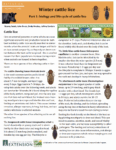
Winter Cattle Lice
Lice infestations during winter housing represent a significant challenge for cattle producers, particularly organic operations raising cattle without chemical inputs. This series of fact sheets from University of Vermont Extension describes the life cycle of cattle lice, control strategies based on integrated pest management (IPM) principles, and the use of essential oils as alternative controls. […]
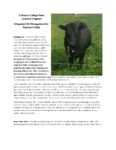
Integrated Fly Management for Pastured Cattle
In grazing systems, flies can not only be a nuisance for cattle but can also cause herd health problems like pink eye, and reduce milk production and weight gain. Matt Steiman, livestock manager at Dickinson College Farm worked with Dr. Jason Smith, entomologist and horticultural specialist at Milton Hershey School to develop this fact sheet […]
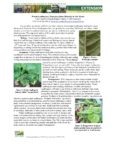
Potato Leafhopper in Dry Beans
As a one-page fact sheet that describes potato leafhopper as a pest in dry beans, this publication provides information on biology, symptoms and management options.
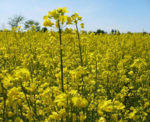
Canola Production for On-Farm Energy
The following production guides, cost calculator and research reports are on canola production, including weed management. They were developed as part of a multi-year research project by University of Vermont Extension on growing sunflowers and canola for on-farm energy. Find research reports on sunflowers here. Production guides Northeast Oilseed Production Manual.pdf 10.18 MB VT Oilseed […]
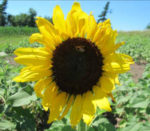
Sunflower Production for On-Farm Energy
The following production guides, cost calculator and research reports are on sunflower production, including weed management. They were developed as part of a multi-year research project by University of Vermont Extension on growing sunflowers and canola for on-farm energy. Find research reports on canola here. Production guides Northeast Oilseed Production Manual.pdf 10.18 MB VT Oilseed […]
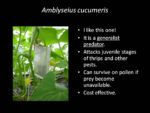
Predatory Mites for Organic Thrips Control in High Tunnel Cucumbers
A presentation of grant-funded research on biological control methods in New York, including cultural practices, plant resistance, grafting, rotations, sprays and beneficials.
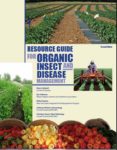
Resource Guide for Organic Insect and Disease Management
Crop management for insects and disease control, photos, fact sheets, and extensive appendices addressing plant resistance, habitats for beneficial insects, trap cropping, and more.
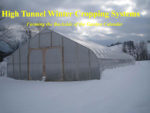
High Tunnel Winter Cropping Systems
A 40-minute presentation by Lewis Jett, West Virginia Extension Service, on the use of high tunnels for winter crop production. Download separate audio and slideshow files:Download audio (MP3, 15MB) Download slideshow (PDF, 10MB)
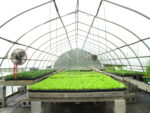
Vegetable Bedding Plants Pest Management
This University of Massachusetts web page has information on integrated pest management (IPM) and organic controls, two practical ways to effectively manage pests on vegetable bedding plants. Vegetable bedding plants are commonly grown in the Northeast as part of the spring sales mix. Although vegetable bedding plants may only be in the greenhouse for a […]
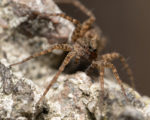
Spiders Provide Conservation Biological Control on Farms
Spiders were the focus of a Northeast SARE Graduate Student Research Grant project conducted by University of Maryland student Dylan Kutz. Kutz was interested in studying these undervalued yet important sources of natural insect control. He said, “Spiders are the most abundant natural enemy that occur in most agroecosystems and are estimated to globally consume […]
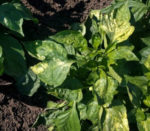
Tomato spotted wilt orthotospovirus and Impatiens necrotic spot orthotospovirus
This fact sheet was written by Pennsylvania State University graduate student Juan Francisco Iturralde Martinez who studied molecular techniques for detecting the viruses: Tomato spotted wilt orthotospovirus (TSWV) and Impatiens necrotic spot orthotospovirus (INSV). The publication provides information and recommendations about the project's model virus TSWV and the closely related virus INSV that can be […]
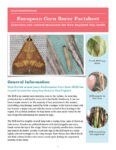
European Corn Borer in Hops
The renaissance of hopyards throughout the Northeast has brought pests not commonly associated with hop growing in other parts of the country. Farmers in New England have found European Corn Borer to be a unique pest in their hopyards. Farmer Ryan Houghton of The Hop Yard in Portland, Maine and David Handley of University of […]
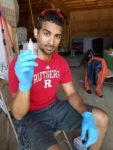
Rutgers student traces genetic trail of BMSB
Knowing that early detection is the most effective strategy to control invasive species, Rutgers University PhD student Rafael Valentin used his Northeast SARE Graduate Student grant to explore a technique using insect DNA to track the brown marmorated stinkbug (BMSB, Halyomorpha halys). Within the past 20 years, BMSB has become a devastating pest across the […]

Weed Weasel prototype provides weed cultivation options for small-scale farms
Weed management is crucial on vegetable farms of all scales but may be particularly challenging for small-scale farms as hand weeding is time consuming while tractor cultivation may not fit with smaller acreages. So, with his Northeast SARE Partnership grant, Jan “Lu” Yoder of Woodmetalcanvas in Westport, MA collaborated with local farmers to build, test […]

Minimizing the risks of Vibrio bacteria in farm-raised oysters grown in intertidal elements of the Delaware Bay
New Jersey’s oyster farms are concentrated on the extensive intertidal sand flats of the lower Delaware Bay where they are exposed twice daily during low tide. Previous studies from the Pacific Northwest indicate that intertidal exposure accelerates the proliferation of Vibrios, increasing the risk to human health.
Beyond Black Plastic
This publication explores sustainable, organic mulches such as cover crops and no-till and reduced tillage systems as alternatives to black plastic mulch for weed control. The booklet includes a discussion of the impact of organic mulches on soil quality and fertility, weed control, yields and waste production, and profitability for small to mid-size vegetable operations.

Organic parasite control
Signs of parasites, prevention, National Organic Program standards, and more.
Control of Red-Headed Flea Beetles en Español
Esta plaga conocida como el “Red-headed Flea Beetle” tiene una variedad de plantas huéspedes que incluye los crisanthemos, Forsythia, los hibiscus, Zinnia, sedum, asters, Salvia, rosas, y los acebos por ejemplo.
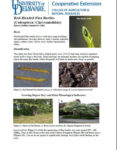
Control of Red-Headed Flea Beetles
Red-headed flea beetles have a wide host range including chrysanthemums, forsythia, hibiscus, lamb’s-quarter, pigweed, zinnia, sedum, asters, Salvia, roses, hollies among many others.
Oilseed Production in the Northeast
A 48-page booklet on sunflower and canola production in the Northeast.